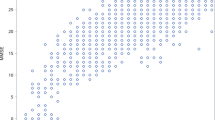Abstract
Objective
In recent years, the Mini-Mental State Examination (MMSE) has been widely used and has been proposed for cognitive decline screening in the framework of a systematic geriatric evaluation in health centers. The aim of the present longitudinal study was to identify the potential determinants of MMSE score and its evolution over a 4-year period in a population aged over sixty years with good general health without dementia and consulting for a health check-up.
Design
Longitudinal study.
Setting
The preventive medical center (CMP) in Nancy.
Participants
687 subjects over 60 years of age (mean age 65.6 ± 5.07 years) were included from the Senior health examination study.
Measurements
All subjects underwent 2 visits over a period of 4 years. MMSE measurement and a self-administered questionnaire of emotional and psychological state were evaluated at baseline and at the follow-up visit.
Results
The major components of total variance of baseline MMSE were represented by education level, practice of regular physical activity, nervousness and despair. Multivariate analysis identified 3 variables at baseline visit that independently predicted annual changes in MMSE: MMSE score, education level and “Difficulty in social relations” (r= −0.222, 0.154 and −0.255 respectively).
Conclusions
Education level and several psychological factors may influence MMSE score and its evolution over time in community-dwelling subjects aged over 60 years without dementia. In these subjects, a low MMSE score does not predict cognitive decline over a period of 4 years. Therefore, the reliability of MMSE in this type of population is questionable.
Similar content being viewed by others
References
Folstein MF, Folstein SE and McHugh PR: “Mini-mental state”. A practical method for grading the cognitive state of patients for the clinician. J Psychiatr Res 12:189–198, 1975
Crum RM, Anthony JC, Bassett SS and Folstein MF: Population-based norms for the Mini-Mental State Examination by age and educational level. JAMA 269:2386–2391, 1993
Bravo G and Hebert R: Age- and education-specific reference values for the Mini-Mental and modified Mini-Mental State Examinations derived from a non-demented elderly population. Int J Geriatr Psychiatry 12:1008–1018, 1997
Derouesne C, Poitreneau J, Hugonot L, Kalafat M, Dubois B and Laurent B: [Mini-Mental State Examination:a useful method for the evaluation of the cognitive status of patients by the clinician. Consensual French version]. Presse Med 28:1141–1148, 1999
Peters R and Pinto EM: Predictive value of the Clock Drawing Test. A review of the literature. Dement Geriatr Cogn Disord 26:351–355, 2008
Kukull WA, Larson EB, Teri L, Bowen J, McCormick W and Pfanschmidt ML: The Mini-Mental State Examination score and the clinical diagnosis of dementia. J Clin Epidemiol 47:1061–1067, 1994
Rakusa M, Granda G, Kogoj A, Mlakar J and Vodusek DB: Mini-Mental State Examination: standardization and validation for the elderly Slovenian population. Eur J Neurol 13:141–145, 2006
Johnson W, Kyvik KO, Mortensen EL, Skytthe A, Batty GD and Deary IJ: Does education confer a culture of healthy behavior? Smoking and drinking patterns in Danish twins. Am J Epidemiol 173:55–63, 2011
Etgen T, Sander D, Huntgeburth U, Poppert H, Forstl H and Bickel H: Physical activity and incident cognitive impairment in elderly persons: the INVADE study. Arch Intern Med 170:186–193, 2010.
Laurin D, Verreault R, Lindsay J, MacPherson K and Rockwood K: Physical activity and risk of cognitive impairment and dementia in elderly persons. Arch Neurol 58:498–504, 2001
Anderson TM, Sachdev PS, Brodaty H, Trollor JN and Andrews G: Effects of sociodemographic and health variables on Mini-Mental State Exam scores in older Australians. Am J Geriatr Psychiatry 15:467–476, 2007
Moraes C, Pinto JA, Jr., Lopes MA, Litvoc J and Bottino CM: Impact of sociodemographic and health variables on mini-mental state examination in a community-based sample of older people. Eur Arch Psychiatry Clin Neurosci 7:535–542, 2010
Lorant V, Deliege D, Eaton W, Robert A, Philippot P and Ansseau M: Socioeconomic inequalities in depression: a meta-analysis. Am J Epidemiol 157:98–112, 2003
Keating HJ, 3rd: “Studying” for the Mini-Mental Status Exam. J Am Geriatr Soc 35:594–595, 1987
Amieva H, Le Goff M, Millet X, et al.: Prodromal Alzheimer’s disease: successive emergence of the clinical symptoms. Ann Neurol 64:492–498, 2008
Jacqmin-Gadda H, Fabrigoule C, Commenges D and Dartigues JF: A 5-year longitudinal study of the Mini-Mental State Examination in normal aging. Am J Epidemiol 145:498–506, 1997
Vinkers DJ, Gussekloo J, Stek ML, Westendorp RG and van der Mast RC: Temporal relation between depression and cognitive impairment in old age: prospective population based study. BMJ 329:881, 2004
Xavier FM, Ferraz MP, Trentini CM, Freitas NK and Moriguchi EH: Bereavementrelated cognitive impairment in an oldest-old community-dwelling Brazilian sample. J Clin Exp Neuropsychol 24: 294–301, 2002
Author information
Authors and Affiliations
Corresponding author
Rights and permissions
About this article
Cite this article
Watfa, G., Husson, N., Buatois, S. et al. Study of mini-mental state exam evolution in community-dwelling subjects aged over 60 years without dementia. J Nutr Health Aging 15, 901–904 (2011). https://doi.org/10.1007/s12603-011-0367-z
Received:
Accepted:
Published:
Issue Date:
DOI: https://doi.org/10.1007/s12603-011-0367-z




